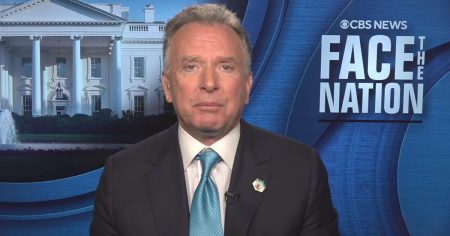Republican State Lawmakers Crack Down on Sanctuary Policies Amid Immigrant Rights Debate
National Trend: States Target Sanctuary Policies with Harsh Penalties
In recent months, Republican state lawmakers across the U.S. have intensified efforts to combat sanctuary policies, which limit local cooperation with federal immigration authorities. Over 20 states have introduced legislation this year aimed at penalizing local governments and officials who resist federal immigration enforcement. These measures include lawsuits, fines, and even jail time for noncompliance. The goal, according to supporters, is to ensure that local governments adhere to federal immigration laws and cooperate with agencies like ICE (U.S. Immigration and Customs Enforcement). Detractors, however, argue that such policies threaten public safety, erode trust between law enforcement and immigrant communities, and raise constitutional concerns.
Georgia’s Legislative Battle: A Case Study in Polarized Politics
Georgia has emerged as a battleground in this national debate. Republican state Sen. Blake Tillery recently sponsored legislation that would allow individuals to sue local governments, officials, and employees for implementing sanctuary policies. The bill, which passed the Senate and is now under consideration in the House, has sparked sharp divisions. Proponents, like Tillery, argue that the measure provides "teeth" to enforce compliance with state immigration laws. Critics, including Democratic state Sen. Nikki Merritt, warn that the legislation could pressure local law enforcement to overstep their authority, leading to prolonged detentions of immigrants in violation of federal law. Merritt fears that such policies undermine the efforts of local law enforcement to keep communities safe.
Broadening the Crackdown: State-by-State Approaches to Sanctuary Policies
Georgia is not alone in its efforts to curb sanctuary policies. Other states have adopted or proposed similarly aggressive measures. In Louisiana, Attorney General Liz Murrill recently sued the Orleans Parish Sheriff’s Office, alleging that its policies limit cooperation with ICE. The sheriff’s office restricts ICE access to its facilities and only honors detainer requests in cases involving serious crimes. Murrill’s lawsuit seeks to overturn a federal court order that has governed the sheriff’s policies since 2013.
In Florida, Republican Gov. Ron DeSantis signed a sweeping immigration law that requires the state attorney general to take legal action against local governments that refuse to detain immigrants illegally in the country. Local officials who deliberately violate the ban on sanctuary policies could face fines of up to $5,000.
Tennessee has gone even further, enhancing penalties for local officials who support sanctuary policies. Under a law signed by Gov. Bill Lee, elected officials who vote for such policies could face felony charges punishable by up to six years in prison. Legislative attorneys have raised concerns that these penalties may violate constitutional protections for elected officials acting in their official capacities.
Wyoming, which has no known sanctuary jurisdictions, has taken a preemptive approach. Legislation passed by the House and pending in the Senate would not only bar local governments from adopting sanctuary policies but also prevent citizens from proposing such policies through initiative petitions. The measure includes steep penalties, including the withholding of state funds, felony charges punishable by 5-10 years in prison, and fines of up to $20,000 for noncompliant officials. Republican state Rep. Joel Guggenmos, the bill’s sponsor, acknowledged that Wyoming does not currently face a sanctuary problem but argued that the legislation is necessary to prevent future issues.
South Dakota, under Republican Gov. Larry Rhoden, enacted an anti-sanctuary measure as the first item on his legislative agenda. The law prohibits state and local policies that limit communication with federal officials about individuals’ immigration status. However, it does not include penalties, setting it apart from other states.
Federal Support for State Actions: The Trump Administration’s Role
The state-level crackdown on sanctuary policies aligns with the Trump administration’s broader efforts to enforce federal immigration law. The Department of Justice has sued jurisdictions like Illinois, Chicago, and Cook County, alleging that their sanctuary policies violate federal law. In Georgia, a law enacted last year already requires local law enforcement to cooperate with federal authorities to identify and detain immigrants in the U.S. illegally. Failure to comply can result in the loss of state funding and misdemeanor charges. The recently passed Senate bill takes this a step further by allowing individuals to sue local governments and officials for violating the ban.
Immigrant Communities and Advocates Sound the Alarm
Immigrants and advocates in Georgia and other states have expressed deep concerns about the potential impact of these measures. They argue that such legislation exacerbates fear in communities already anxious about ICE arrests in sensitive locations like homes, churches, and schools. Atlanta immigration attorney Charles Kuck, an opponent of the Georgia bill, characterized the measures as part of “Donald Trump’s war on immigrants,” driven by political opportunism rather than practical solutions. “This doesn’t solve any problems,” Kuck said. “It just garners favor with the president.”
Mike Mitchell, deputy executive director of the Georgia Sheriffs’ Association, noted that sheriffs in the state are already following immigration law. However, he acknowledged the potential risks of increased litigation and pressure on local law enforcement to overcomply with federal requests. “We’re threatening our local law enforcement who are doing the best job they can to keep our communities safe,” warned Democratic state Sen. Nikki Merritt.
The Broader Implications: A Divisive Debate with Far-Reaching Consequences
The push to penalize sanctuary policies reflects a growing divide between state and federal priorities on immigration enforcement. While supporters frame these measures as necessary to uphold the rule of law and protect public safety, critics argue that they undermine trust between law enforcement and immigrant communities, potentially leading to less effective policing. The Orleans Parish Sheriff’s Office, for example, has emphasized that its policies are designed to ensure compliance with federal court orders while protecting the rights of all individuals, regardless of immigration status.
As the debate over sanctuary policies continues to unfold, it remains to be seen whether these state-level crackdowns will withstand legal challenges. Opponents have already raised concerns about the constitutionality of certain penalties, particularly those targeting elected officials. At the same time, the Trump administration’s support for these measures signals a dramatic shift in the federal-state balance of power on immigration issues.
For now, the legal and political battles over sanctuary policies serve as a stark reminder of the polarizing nature of immigration reform in the United States. As lawmakers in states like Georgia, Louisiana, and Tennessee move forward with aggressive enforcement measures, immigrant communities and their allies are bracing for the potential consequences. The outcome of these efforts will likely shape the lives of millions of immigrants and the principles of local autonomy for years to come.















